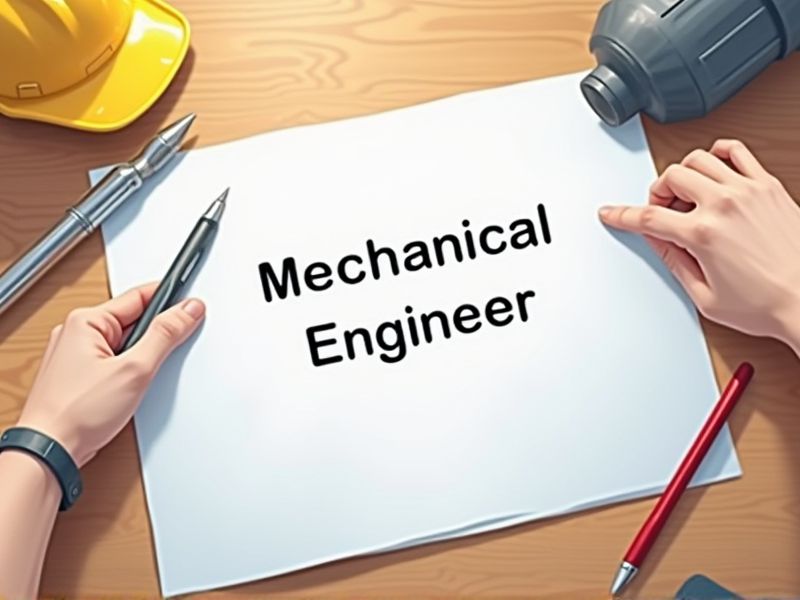
Mechanical engineers often require certain certifications to validate their expertise and enhance their professional credibility. Obtaining certifications can increase job opportunities and allocate engineers to more specialized roles. Certifications also ensure compliance with industry standards and promote a commitment to quality and safety in engineering practice. Below are some key certifications that mechanical engineers might consider pursuing.
Fundamentals of Engineering (FE)
Passing the Fundamentals of Engineering (FE) exam is crucial for mechanical engineers because it serves as the initial step towards obtaining a Professional Engineer (PE) license, which is often required for career advancement and greater job responsibility. Completing the FE exam demonstrates a solid understanding of core engineering principles, which is essential for quality assurance and safety in engineering projects. Employers often regard the FE credential as a sign of a candidate's commitment and competency, increasing job opportunities and potential for higher salaries. States in the U.S. typically require this certification to ensure engineers have met specific educational and ethical standards necessary to protect public interest.
Professional Engineer (PE)
A Professional Engineer (PE) license ensures that mechanical engineers adhere to industry standards and best practices, enhancing safety and reliability. The credential signifies a commitment to ethical practices, fostering trust with clients and employers. Many governmental and large-scale projects require a PE for project approval to ensure compliance with regulations. Obtaining a PE can lead to career advancement and higher earning potential as it distinguishes professionals in a competitive field.
Certified Manufacturing Engineer (CMfgE)
A Certified Manufacturing Engineer (CMfgE) enhances a mechanical engineer's expertise in modern manufacturing processes, which drives process efficiency. Companies often expect engineers to minimize production costs, and having a CMfgE certification demonstrates proficiency in cost-effective production methods. This certification provides mechanical engineers with a competitive edge in the job market, often leading to career advancement. Manufacturers prioritize minimizing downtime and ensuring product quality, thus certified engineers are crucial for maintaining high operational standards.
Certified Quality Engineer (CQE)
Certified Quality Engineers (CQEs) ensure that engineering processes meet industry standards, which enhances product reliability in mechanical engineering projects. Their expertise in quality control and assurance minimizes defects and reduces waste, leading to cost savings. CQEs utilize data-driven decision-making to identify process improvements, increasing operational efficiency. In industries where safety and compliance are critical, CQEs maintain regulatory adherence, safeguarding both the company and its consumers.
Certified Energy Manager (CEM)
A Certified Energy Manager (CEM) boosts a mechanical engineer's capability to design and implement energy-efficient systems, reducing operational costs. The CEM credential enhances an engineer's knowledge in energy management, ensuring adherence to regulations and standards. Organizations often seek CEMs to optimize energy performance, which can lead to significant financial savings and environmental benefits. The evolving focus on sustainability and energy conservation in engineering projects underscores the relevance of CEM certification for career advancement.
Six Sigma Green Belt Certification
Mechanical engineers who earn a Six Sigma Green Belt Certification often improve process efficiency by using data-driven decision-making. This certification provides them with tools for identifying and reducing waste, which can lead to cost savings and higher-quality products. Mastery of Six Sigma methodologies enhances their problem-solving abilities, making them valuable assets in project management. Many industries prioritize hiring engineers with this certification, reflecting its impact on career advancement and competitive positioning.
Project Management Professional (PMP)
Mechanical engineers often work on complex projects requiring coordination across teams; PMP certification equips them with skills to efficiently plan, execute, and oversee these projects. The structured project management techniques learned can lead to better resource allocation and risk management, reducing delays and costs. With PMP, engineers enhance their leadership abilities, crucial for guiding multidisciplinary teams toward common objectives. In many industries, PMP is regarded as a mark of professionalism, potentially boosting career opportunities and salary prospects for mechanical engineers.
SolidWorks Certified Professional (CSWP)
Obtaining a SolidWorks Certified Professional (CSWP) credential verifies a mechanical engineer's proficiency in advanced modeling and design, enhancing their skill set for complex projects. This certification is often a requisite by employers to ensure that engineers have the necessary competency in using SolidWorks software effectively in professional settings. Possessing a CSWP certification can lead to better job prospects and career advancement, as it demonstrates a commitment to continuous learning and technical excellence. Employers tend to prefer candidates with a CSWP certification, as it reduces training time and ensures high productivity from the onset.
AutoCAD Certified Professional
An AutoCAD Certified Professional status acts as a validation of a mechanical engineer's proficiency in using the software for complex design and modeling tasks. Mastery of AutoCAD applications directly enhances an engineer's capability to produce precise and accurate technical drawings, critical for manufacturing processes. The certification serves as a competitive edge in the job market, often translating to better job prospects and salary potential. Being certified signifies a commitment to maintaining industry standards, which can lead to greater trust and collaboration with clients and colleagues.
ANSYS Certification
Gaining an ANSYS Certification validates a mechanical engineer's proficiency in using simulation software, which is crucial for efficient product design and testing. Many organizations look for certified individuals to ensure they have the requisite skills to tackle complex engineering problems using advanced tools. Possessing this certification often leads to better job prospects as it demonstrates a commitment to maintaining up-to-date technical knowledge. The certification process enhances problem-solving skills, making engineers more adept at predicting real-world performance of designs, thereby reducing the need for costly physical prototypes.
Summary
By obtaining certifications, you enhance your skills and stand out in the competitive field of mechanical engineering. Certifications often result in increased job opportunities and a potential for higher salary. Employers tend to prefer certified professionals due to the perceived assurance of specialized expertise and commitment. Gaining certifications can also keep you updated with the latest industry standards and technologies, helping maintain career relevance.
